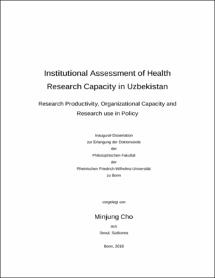Institutional Assessment of Health Research Capacity in UzbekistanResearch Productivity, Organizational Capacity and Research use in Policy

Institutional Assessment of Health Research Capacity in Uzbekistan
Research Productivity, Organizational Capacity and Research use in Policy

| dc.contributor.advisor | Gerke, Solvay | |
| dc.contributor.author | Cho, Minjung | |
| dc.date.accessioned | 2020-04-24T19:18:06Z | |
| dc.date.available | 2020-04-24T19:18:06Z | |
| dc.date.issued | 11.06.2018 | |
| dc.identifier.uri | https://hdl.handle.net/20.500.11811/7442 | |
| dc.description.abstract | Health research continues to be an important policy instrument in improving population’s health and building a more resilient health system. As developing countries are unable to meet their national health-research needs, many foreign aid actors have concentrated on improving health research system (HRS) of low-income countries since 1990s. While there is growing interest, there is a gap in the literatures in understanding health research system in the framework of institutions and its actors in a developing country context, which affects the knowledge production and research performance. In light of this argument, the thesis focuses on Uzbekistan. Uzbekistan was ranked as one of the lowest health research producers in the world in 2016. This raises the following question: Has post-soviet political and economic transition brought changes to health research system in Uzbekistan? If so, what was the outcome of change from these reform pressures? To answer this question, this thesis combines elements of neo-institutional theories to analyze the processes of institutional modification in health research system over the past twenty years in Uzbekistan. The results from both quantitative and qualitative analysis revealed that the slow progress in any institutional change in the health sector was due to path dependent traits dating back to more than 60 years of Soviet science management. Basic incentive structures or forced regulatory reforms, which reinforce path-dependent behavior, often failed to create significant change in Uzbek health research performance. Further analysis revealed that causes of (under)performance in Uzbek health research system are complex and deeply rooted, reaching beyond the current circumstances and resources. The institutionalist approach proved useful in understanding transformations in post-soviet countries taking into account the particularities of local/national research institutions. | en |
| dc.language.iso | eng | |
| dc.rights | In Copyright | |
| dc.rights.uri | http://rightsstatements.org/vocab/InC/1.0/ | |
| dc.subject.ddc | 300 Sozialwissenschaften, Soziologie, Anthropologie | |
| dc.title | Institutional Assessment of Health Research Capacity in Uzbekistan | |
| dc.title.alternative | Research Productivity, Organizational Capacity and Research use in Policy | |
| dc.type | Dissertation oder Habilitation | |
| dc.publisher.name | Universitäts- und Landesbibliothek Bonn | |
| dc.publisher.location | Bonn | |
| dc.rights.accessRights | openAccess | |
| dc.identifier.urn | https://nbn-resolving.org/urn:nbn:de:hbz:5-50731 | |
| ulbbn.pubtype | Erstveröffentlichung | |
| ulbbnediss.affiliation.name | Rheinische Friedrich-Wilhelms-Universität Bonn | |
| ulbbnediss.affiliation.location | Bonn | |
| ulbbnediss.thesis.level | Dissertation | |
| ulbbnediss.dissID | 5073 | |
| ulbbnediss.date.accepted | 09.11.2017 | |
| ulbbnediss.institute | Zentrale wissenschaftliche Einrichtungen : Zentrum für Entwicklungsforschung (ZEF) | |
| ulbbnediss.fakultaet | Philosophische Fakultät | |
| dc.contributor.coReferee | Antweiler, Christoph |
Files in this item
This item appears in the following Collection(s)
-
E-Dissertationen (712)




